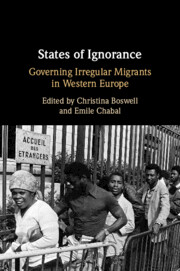Book contents
- States of Ignorance
- States of Ignorance
- Copyright page
- Contents
- About the Editors and Contributors
- Acknowledgements
- Introduction
- 1 States, Knowledge and Ignorance
- 2 The Post-war European State and (Irregular) Migration
- 3 The Invention of Illegal Immigration
- 4 (Im)perfect Control
- 5 From Ignorance to Illegalisation
- 6 Denial, Elucidation or Resignation? British and German State Responses to Unauthorised Migrants
- 7 To See or Not to See
- 8 European Integration and the Leap into the Unknown
- 9 Control Infrastructures and Ignorance
- Index
- References
Introduction
Migration Control and Strategies of Knowledge Production
Published online by Cambridge University Press: 02 November 2023
- States of Ignorance
- States of Ignorance
- Copyright page
- Contents
- About the Editors and Contributors
- Acknowledgements
- Introduction
- 1 States, Knowledge and Ignorance
- 2 The Post-war European State and (Irregular) Migration
- 3 The Invention of Illegal Immigration
- 4 (Im)perfect Control
- 5 From Ignorance to Illegalisation
- 6 Denial, Elucidation or Resignation? British and German State Responses to Unauthorised Migrants
- 7 To See or Not to See
- 8 European Integration and the Leap into the Unknown
- 9 Control Infrastructures and Ignorance
- Index
- References
Summary
This introductory chapter sets out the core arguments of the book. It introduces the key concepts and theoretical approach, including state rationality, strategies of knowledge production and state ignorance. It then outlines the three lenses for exploring ignorance: ignorance as omission, ignorance as strategy and ignorance as ascription. Finally, it sets the scene for the empirical analysis, introducing the issue of irregular migrants, and explaining the comparative research design that focuses on three case studies: France, Germany and the UK.
Information
- Type
- Chapter
- Information
- States of IgnoranceGoverning Irregular Migrants in Western Europe, pp. 1 - 32Publisher: Cambridge University PressPrint publication year: 2023
References
Accessibility standard: Unknown
Why this information is here
This section outlines the accessibility features of this content - including support for screen readers, full keyboard navigation and high-contrast display options. This may not be relevant for you.Accessibility Information
- 1
- Cited by
